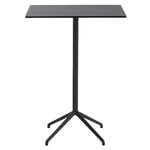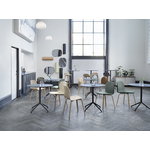Muuto’s Still Café bar tables were designed, as their name suggests, especially for bar and restaurant use, but the sleek and refined tables are a great match for various environments from domestic kitchens to office and conference settings. Designed by Iskos-Berlin, Still Café table features a robust, four-legged aluminium base and an easily cleanable nanolaminate tabletop. Thanks to its minimalist monochrome expression, Still Café table goes together with all types and colours of chairs.


Still Cafe bar table 75 x 65 cm, h. 105 cm, black
Muuto
Description
Muuto’s Still Café bar tables were designed, as their name suggests, especially for bar and restaurant use, but the sleek and refined tables are a great match for various environments from domestic kitchens to office and conference settings. Designed by Iskos-Berlin, Still Café table features a robust, four-legged aluminium base and an easily cleanable nanolaminate tabletop. Thanks to its minimalist monochrome expression, Still Café table goes together with all types and colours of chairs.
Product details (9)
- Colour
- Black
- Length
- 75 cm
- Width
- 65 cm
- Height
- 105 cm
- Material
- Mounting plate and tube: powder coated steel
- Table top material
- MDF with nanolaminate finish, painted edges
- Frame material
- Die-cast aluminum
- Notes
- Indoor use only
- Care instructions
- Clean the table with a damp cloth. If necessary use a mild detergent or washing up liquid and not concentrated. Always wipe with a dry cloth afterwards. To minimize the risk of stains and marks, liquids, grease etc. should be removed straight away.
- Product ID
Designer
Copenhagen based Iskos-Berlin is a partnership between the designers Boris Berlin and Aleksej Iskos. Founded in 2010, Iskos-Berlin works in furniture design and also industrial and graphic design. The creative duo experiments with new techniques and materials to see what kind of an impact they have on everyday objects.
View all productsReviews (0)
Sustainability
The Product Sustainability Framework, our criteria of sustainable design, helps you find the most sustainable products in our selection. Read below which sustainability criteria this product has met.
Working conditions & labour 7/9
-
Equal opportunities for all employees
-
Commitment to UN Global Compact, fair compensation for all employees
-
Corporate responsibility requirements defined and communicated for suppliers
-
Systematic work for improved inclusion and well-being in the workplace
-
Transparent supply chain
-
Suppliers' compliance to a code of conduct ensured
-
Compliance to the UN Guiding Principles on Business and Human Rights ensured in the supply chain
Eco-friendly production 9/9
-
Fair and resource-wise water-use in production
-
No incineration or landfilling of returned items
-
No use of endangered species as materials
-
No direct environmental emissions or waste (excl. GHGs) from production
-
The sustainability of direct suppliers' production is addressed and monitored
-
Production and material sourcing that respect biodiversity, animal rights, and natural ecosystems
-
Material-efficient and ecological packaging
-
Positive impact on nature’s well-being through operations that regenerate natural ecosystems
-
No potentially harmful chemicals used in own production
Climate impact 5/8
-
Company's direct greenhouse gas emissions identified and commitment to reduction
-
Product's carbon impact identified and commitment to reduction
-
Guidance on energy- and eco-efficient use of the product
-
Contribution to climate initiatives beyond the brand’s direct operations
-
Carbon footprint of the product calculated and goals set to reduce it
Sustainable materials 4/6
-
Sustainable and long-lasting material choices
-
No harmful or hazardous substances
-
Responsible raw material sourcing and production
-
Materials suited for circularity: monomaterials, recyclable finishings, renewable or recycled contents etc.
Circular design 4/5
-
High aesthetic quality promoting long-term use of the product
-
Technically durable product design and material choices
-
Design for enduring life-long quality
-
Design and support for product maintenance, repair and upgradability






